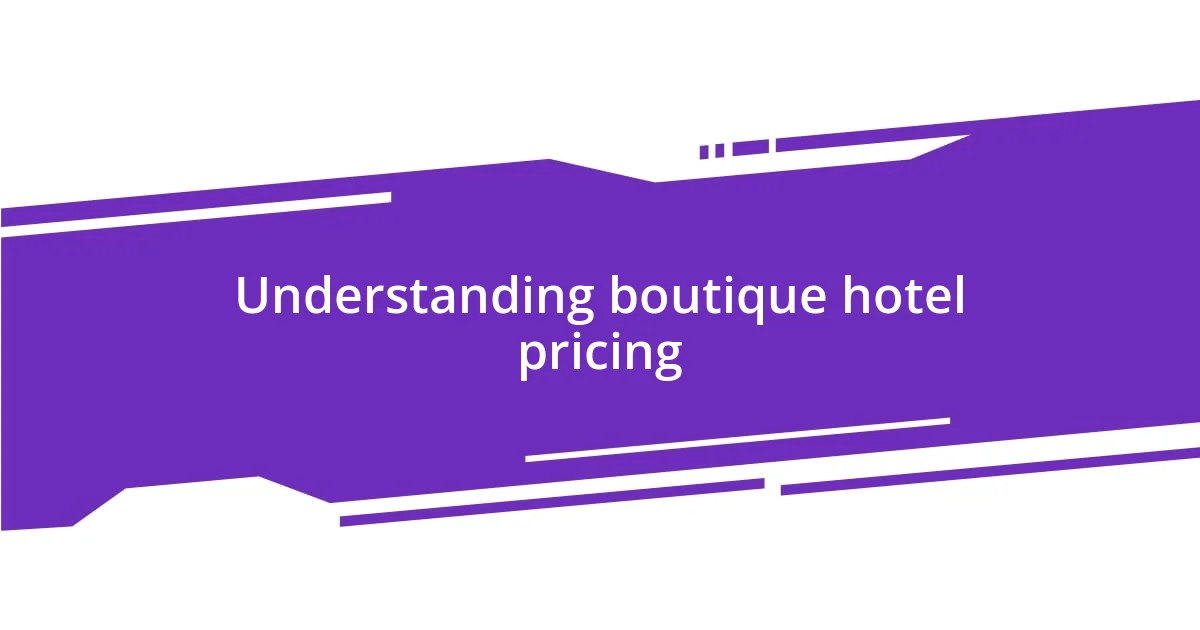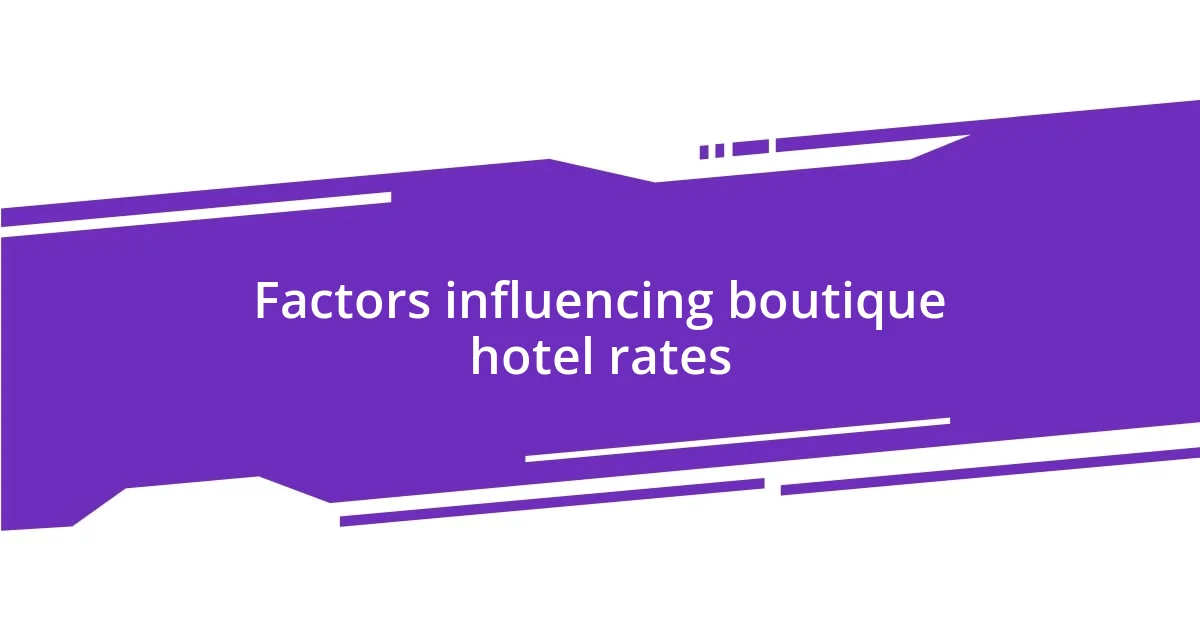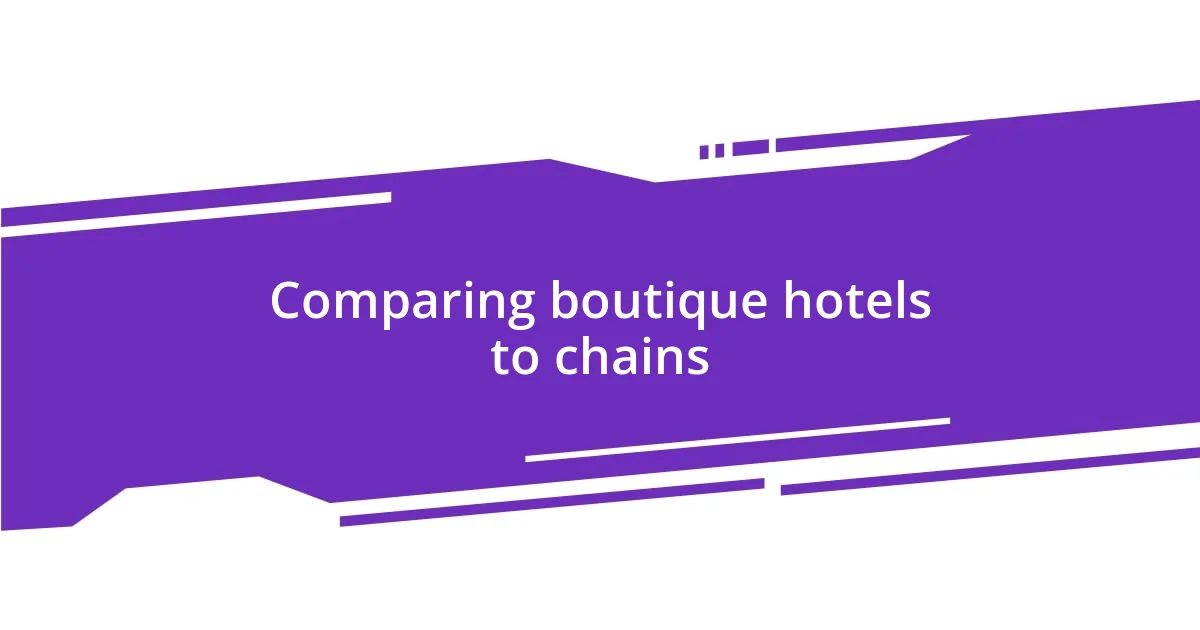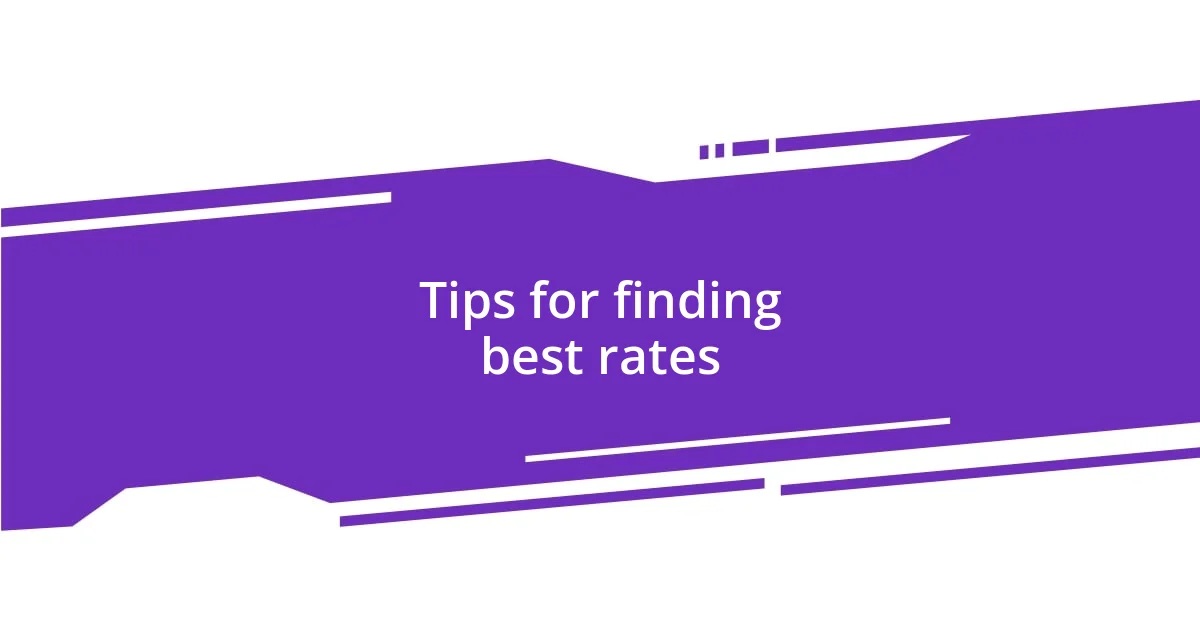Key takeaways:
- Boutique hotel pricing is influenced by factors such as personalization, location, seasonality, and unique amenities, which contribute to a memorable guest experience.
- Comparing boutique hotels to chains, the former often provide a unique, local atmosphere and personalized services, justifying their higher prices.
- Effective strategies for securing the best rates include booking early, being flexible with travel dates, inquiring directly with hotels for potential discounts, and leveraging social media for promotional offers.

Understanding boutique hotel pricing
Boutique hotel pricing often reflects the unique experience each property offers. I remember staying at a charming boutique in a quiet neighborhood, where the owner personally curated every piece of decor. This attention to detail doesn’t just enhance the ambiance; it also factors into the overall cost. When you think about it, isn’t that what you’re really paying for?
Another aspect to consider is the location. I once booked a boutique hotel that was slightly more expensive, but its proximity to trendy cafés and art galleries made it worth every penny. Have you ever wondered why some people seem willing to pay a premium for smaller hotels? It’s because they offer a sense of individuality that larger chains often lack, making each stay feel special and memorable.
Lastly, fluctuations in demand can significantly impact pricing. I recall planning a last-minute trip during peak season, and the prices of my preferred boutique hotels skyrocketed. It really made me think about how timing can affect not just the budget, but the overall travel experience. Isn’t it interesting how the right timing can lead to unexpected treasures or a sudden budget crunch?

Factors influencing boutique hotel rates
When it comes to boutique hotel rates, several factors intertwine to shape pricing. One compelling element is the level of personalization and service. I once stayed at a boutique that offered tailored recommendations for local dining, which made me feel like a VIP. This level of attention, often reflected in the cost, can transform a regular stay into an extraordinary experience.
Additionally, the size and character of the hotel play a critical role in pricing. Smaller boutique hotels often charge more because they provide a distinctive charm and atmosphere that larger franchises can’t replicate. Here are some key factors influencing boutique hotel rates:
- Location: Proximity to attractions and the overall desirability of the neighborhood can greatly increase rates.
- Seasonality: Prices fluctuate based on the time of year, holidays, or local events that boost demand.
- Amenities: Unique offerings—like spa services or exclusive local tours—can add to the price tag.
- Design and Quality: The aesthetic and craftsmanship that goes into the hotel’s decor and infrastructure often comes at a premium.
- Service Levels: Personalized services, such as custom meals or concierge assistance, can enhance the value, reflecting in the rates.
In my experience, understanding these factors gives me a better perspective when booking my next stay.

Comparing boutique hotels to chains
When I think about the differences between boutique hotels and chain hotels, the first thing that strikes me is the feel of each experience. Boutique hotels often aim to create a uniquely local atmosphere, which I find invigorating. I remember stepping into a boutique in Paris where the barista was not only friendly but also excitedly shared stories about the neighborhood. It feels more like visiting a friend’s stylish home than a standard hotel, doesn’t it?
In contrast, chain hotels typically offer a predictable experience, with consistency being their hallmark. During a family road trip last summer, we stayed at a well-known chain. While everything was efficient and comfortable, it lacked the personal touch I cherish. Chain hotels are great for reliability, but where’s the fun in that?
When we consider pricing, it’s fascinating to observe how each type positions itself in the market. Boutique hotels may charge more because we associate them with exclusivity and bespoke experiences. A splurge I took at a boutique hotel in Barcelona, for instance, felt justified when I was treated to unique, handcrafted breakfasts and local art displayed throughout the property. It was an investment in a memorable experience, different from the more uniform offerings at a chain.
| Boutique Hotels | Chain Hotels | |
|---|---|---|
| Experience | Unique, local atmosphere | Consistent, predictable experience |
| Pricing | Often higher for personalized services | Usually lower due to standardization |
| Service | Personalized attention | Standardized customer service |
| Amenities | Unique and tailored amenities | Standard amenities available |

Value of unique amenities offered
When I reflect on the unique amenities offered by boutique hotels, I find they often create unforgettable experiences. For instance, at one boutique in New Orleans, the hotel staff organized a guided ghost tour. It wasn’t just an add-on; it became a core memory of my trip, intertwining history and local lore in a way that generic hotel amenities never could. This type of special offering shapes my perception of value—I feel like I’m receiving a treasure trove of experiences rather than just a place to sleep.
Moreover, I can’t help but appreciate the thoughtful touches that some boutique hotels weave into their services. I remember staying at a charming little spot in Florence that provided complimentary cooking classes with their in-house chef. The excitement of learning how to make authentic pasta, all while laughing and sharing stories, is something I’d gladly pay extra for. In my view, these unique amenities enrich my stay well beyond the physical comforts, immersing me in the local culture.
Isn’t it incredible how a single amenity can elevate an entire trip? I recall another experience at a boutique hotel with a rooftop terrace that offered outdoor yoga sessions at sunrise. The view of the city waking up around me, combined with the calming presence of nature, created such a serene start to my day. These personalized offerings not only justify a higher price point but also forge a deeper connection with the destination.

Tips for finding best rates
Finding the best rates for boutique hotels can feel like a treasure hunt, but with a few strategies, I often come away with fantastic deals. One tip that has served me well is checking for exclusive promotions on the hotel’s website or signing up for their newsletter. I remember booking a lovely boutique hotel in Lisbon that offered a 20% discount to email subscribers. It felt like finding an extra gift in my inbox!
Flexibility can also play a big role in scoring better rates. If your travel plans allow it, consider adjusting your dates slightly. For instance, I once shifted my stay by just a couple of days, and I ended up saving almost a hundred dollars. It’s amazing how some boutique hotels have fluctuating rates based on demand, and a little flexibility can yield significant savings.
Lastly, don’t shy away from making a call to the hotel directly. Sometimes, a friendly conversation can lead to unexpected perks or discounts. I distinctly recall when I reached out to a boutique in Nashville to inquire about pricing, and they not only offered me a better rate but also upgraded my room for free. It’s those personal connections that make the experience truly special, and who knows? You might just stumble upon the best deal simply by asking!

Strategies for booking boutique hotels
When it comes to booking boutique hotels, one strategy that often pays off is timing your reservations. I’ve learned that booking well in advance usually secures better rates, especially in popular travel seasons. Last summer, I planned a trip to a sought-after boutique hotel in Palm Springs three months early, and not only did I lock in a lower price, but I also got a room with an incredible view of the mountains.
It’s also worthwhile to explore booking platforms that specialize in boutique accommodations. I remember when I stumbled upon a lesser-known site that featured a boutique hotel in Mexico City at a significantly discounted price. It felt like a secret club, where the best-kept gems are hiding in plain sight, waiting for someone to discover them. Have you ever found a hidden treasure while browsing online? These platforms often provide insights and reviews that can lead you to unique options you might not have considered otherwise.
Engaging with social media can also be a powerful ally in securing deals. I’ll never forget how I found a charming hotel in Barcelona after following their Instagram page. They were running a flash sale for their followers, and I was lucky enough to snag a room at half price! This direct line of communication opened up not only savings but also the chance to interact with the hotel staff, setting the tone for a wonderfully personalized experience. How many opportunities are we unknowingly missing out on by not tapping into these channels?














